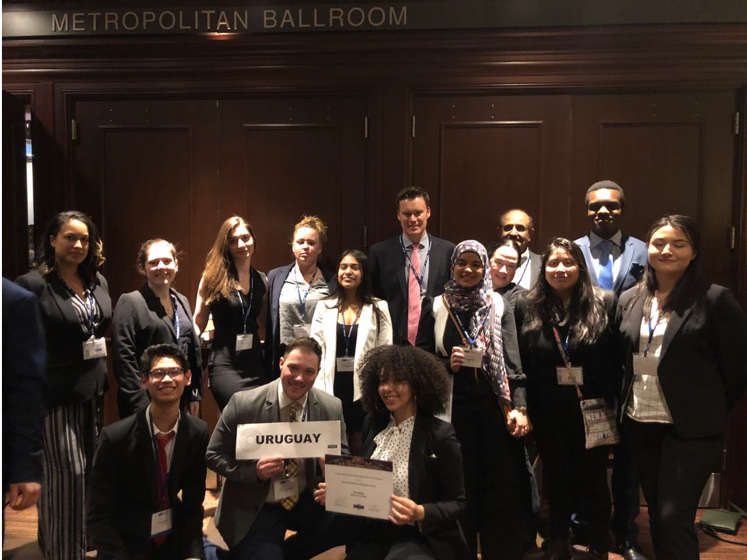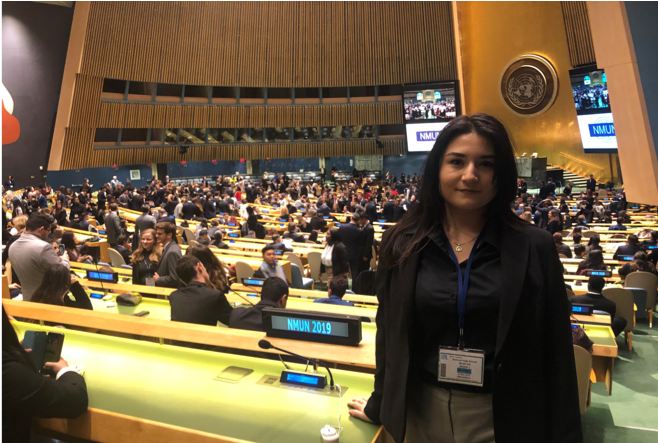From the Classroom to the United Nations
Oct 3, 2019Last spring in the General Assembly Hall of the United Nations, Bellevue College (BC) student Latasha Palmer addressed 5,000 student delegates on the importance of U.N. Sustainable Development Goal 4, which is to ensure inclusive and equitable quality education and promote lifelong learning opportunities for all. The experience itself was a learning opportunity for Palmer,…

Last spring in the General Assembly Hall of the United Nations, Bellevue College (BC) student Latasha Palmer addressed 5,000 student delegates on the importance of U.N. Sustainable Development Goal 4, which is to ensure inclusive and equitable quality education and promote lifelong learning opportunities for all.
The experience itself was a learning opportunity for Palmer, one of 13 BC students who participated in the annual National Model United Nations (MUN) New York conference, the largest collegiate MUN conference in the world.
“Walking into that iconic room where so many powerful leaders have sat and experiencing the excited energy of the next generation of students anxious to change the world gave me a feeling of exhilaration and hope,” said Palmer. “I was nervous up until I got up to the podium to speak. The moment I walked up to the podium my nerves were eased by the feeling of solidarity in the room and the spirit of the world leaders who have stood at that podium before me.”
For Palmer and her fellow students, the road to this moment began the previous Fall Quarter with senior associate professor Tim Jones’ class, Political Science 121, the first of three prerequisite classes BC students are encouraged to take in order to participate in MUN, which draws some 5,000 student ‘delegates’ from around the world together to simulate U.N. committee proceedings as representatives of a country other than their own.
As ‘delegates’, students write position papers, draft resolutions, negotiate with supporters and adversaries, and navigate the U.N.’s rules of procedure in an attempt to mobilize international cooperation to resolve real international problems. Between the opening and closing ceremony, students visit the U.N. and the mission of the country they are chosen to represent, explore New York, and spend plenty of time in committee.
“This is an amazing opportunity to travel to New York, meet with real foreign diplomats, and to visit the United Nations headquarters,” said Jones. “It is also a unique learning opportunity that helps students foster skills related to research, writing, public speaking, problem-solving, consensus building and conflict resolution.”
Over the course of the year, Jones expects his students to gain expertise on the committee they’re assigned for the conference; the topics before their committee; their country’s position on each of those topics; and the rules of procedure.
“It is difficult sometimes, to want to make change, but to not know where to begin. This MUN experience gives a perfect base for that,” said BC student Audrey Bean. “It makes you aware of global issues. It allows you to meet with other young adults with brilliant ideas on how to change systems for the better. It is wonderful for connecting with people you would have never had the opportunity to meet, and it really makes students find their confidence in their own ideas.”

The 13 BC students competed against mostly third- and fourth-year students and took home an “Honorable Mention Delegation” award. In addition, two students, Thomas Adrian and Carolina Valdez, took home “Outstanding Position Paper” awards.
“I expected to learn about the U.N., how to create a resolution and methods of diplomacy. I did not expect to grow so much as a person on this trip,” said Palmer. “Spending four days in the U.N. environment, in New York, and collaborating with students from around the world to create a document that addresses real world issues taught me more about my strengths and weaknesses than any other class ever could. I have gained confidence in myself and my abilities.”
Since the learning in this program is almost entirely experiential and project-based, students get far more from this experience than a typical class on campus, Jones said. They spend a year together and become a team and, he says, most feel like a family by the end of it.
“I find that students usually end up caring more about the world, have more awareness of and empathy for other points of view, and want to become more active in their communities after this experience,” said Jones.
Not that it’s easy. Jones notes that students often struggle in the beginning. Some have never traveled to New York when they join the program, or even taken a plane, while others have never worn professional attire before or lack confidence in their knowledge of world affairs, research and public speaking.
“They are challenged, but they grow immensely,” said Jones. “Most students end up having a truly transformational and empowering experience that gives them confidence for future endeavors.”
